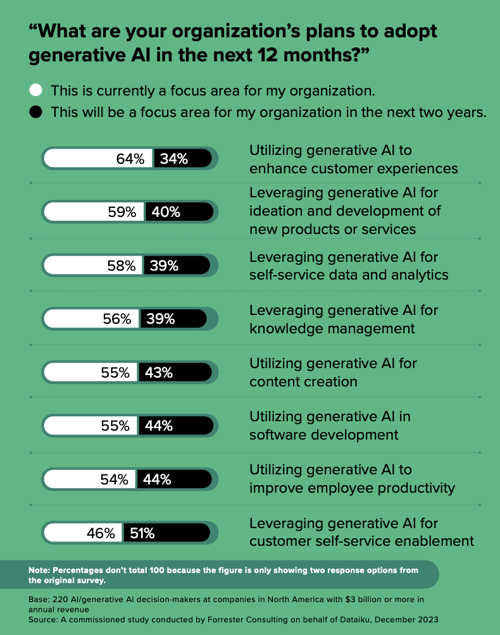You might remember our data leaders survey with Databricks from June where we learned that 45% of organizations were already experimenting with Generative AI, while more than 60% said they planned to use it within the year. Well, six months have passed since then and, with the analytics and AI landscape evolving so rapidly since Generative AI came on the scene, we knew we wanted to take the conversation even further.
That’s why we are excited to share insights from our newly-released Forrester Opportunity Snapshot — a commissioned custom study conducted by Forrester Consulting on behalf of Dataiku — based on a survey of 220 AI decision makers at large companies in North America. To no surprise, there is a clear trend toward leveraging Generative AI capabilities, with 83% of respondents indicating they are currently exploring or experimenting with the technology.
When it comes to building a modern AI platform, we’ve said before that organizations shouldn’t spend time, energy, or resources cobbling together tools across the AI lifecycle, which ultimately results in losing the larger picture of the full data pipeline (not to mention adds technical debt).
Instead, investing in an end-to-end platform for AI (including Generative AI) provides advantages like cost savings from reuse, smoother governance and monitoring, the ability to focus on implementing high-impact technologies (including the latest and greatest Generative AI services), and more.
The survey supports this notion: Platforms offer safer implementation and better scalability, providing a collaborative set of capabilities to reduce implementation hurdles as organizations adopt and accelerate Generative AI applications. Because the truth is, enterprises understand the transformative potential of Generative AI and have been experimenting with it for over a year. Where they get stuck is a lack of a full set of collaborative capabilities necessary to operationalize Generative AI. We’ll dive into that topic and some of the other key survey takeaways here.
64% of Organizations Are Using Generative AI to Enhance Customer Experiences
Enterprises have already identified Generative AI use cases and are eager to embrace the richness of its versatility. Notably, when asked about their organizations’ plans to adopt Generative AI in the next 12 months, 64% of survey respondents cited using Generative AI to enhance customer experiences as a current focus area for their organization, closely followed by leveraging the tech for ideation and development of new products or services (59%).
Examples of how Generative AI can be used to enhance customer experiences include personalized product or content recommendations, dynamic website personalization, chatbots and virtual assistants, enhanced marketing campaign personalization, and more.
Teams Are Using Generative AI to Both Optimize Existing Processes AND Unlock New Revenue Streams
Sixty-one percent of organizations cited enhancing current product offerings as a key benefit seen from leveraging Generative AI capabilities, followed closely by creating new products and services (57%) and pursuing new markets and opportunities (57%). All of these broadly bucket together into things that companies couldn’t do before, which is especially interesting because it’s actually probably easier for organizations to optimize existing things instead of creating new offerings and, therefore, revenue streams. Generative AI, though, is inspiring them to do both, with teams also optimizing internal operations, capturing and applying scarce knowledge, and improving decision making.
Tie for Biggest Risks Regarding the Usage of Generative AI
An equal percentage of survey respondents (31%) cited both privacy and data protection concerns and challenges developing the governance to deal with Generative AI as risks surrounding the technology. These risks of Generative AI adoption are amplified with the technical challenges organizations may already be dealing with wherever they are on their scaling journey.
Bringing It All Together: Follow the Platform Path
Over the last decade, software platforms have emerged that are designed to allow enterprises to build machine learning and AI capabilities into their business. Dataiku is the established leader in this category, enabling organizations to quickly integrate new innovations (like Generative AI and LLMs) into their enterprise technology stack and their business processes.
From Dataiku, “Why You Need an AI Platform to Scale Generative AI”
By using an AI platform like Dataiku, organizations can leverage a structured environment that facilitates seamless integration with existing systems, workflows, and data, which helps mitigate challenges related to infrastructure and ensure that Generative AI is smoothly incorporated into the organization’s processes.
Further, the platform is designed to scale with the organization’s needs, meaning that Generative AI implementation can grow seamlessly as demands increase, minimizing the risk of any scalability issues that might hinder performance or responsiveness. Finally, Dataiku’s interface facilitates frictionless collaboration among different teams, ensuring that stakeholders can contribute to the development and deployment process, reducing the risk of miscommunication or siloed efforts.






